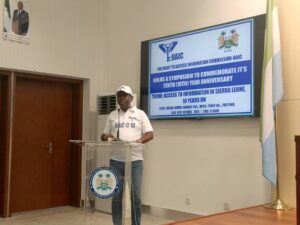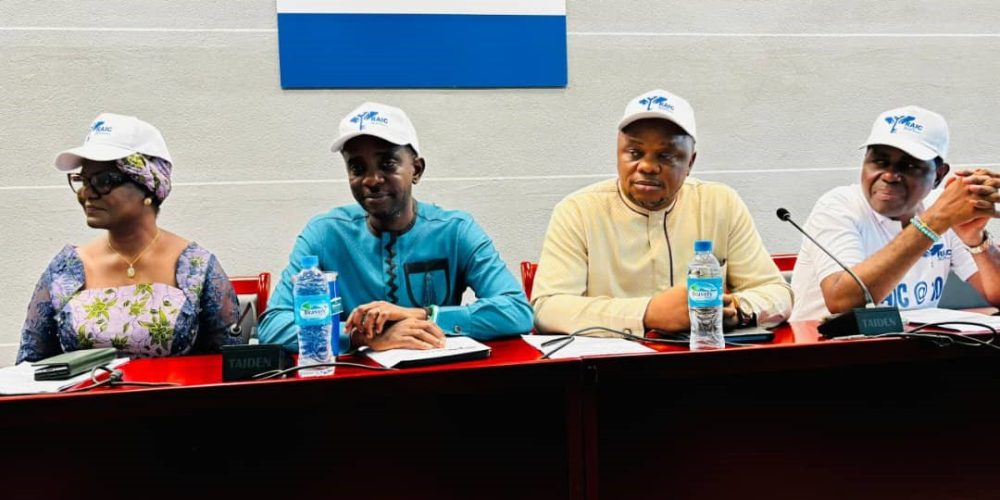By Expo Staff Writer
The Right to Access Information Commission (RAIC) has commenced commemoration of its 10th anniversary with a symposium on Tuesday, 15th October, 2024, at the Foreign Service Academy drawing participants from government, the media, civil society and the international community.
In his welcoming address, Dr Ibrahim Seaga Shaw, the Chairman and Information Commissioner, highlighted gains, challenges and opportunities experienced by the Commission over the years. He said, regardless of the several challenges, there has been significant progress in the right to access information architecture in Sierra Leone.
“In 2018 when we came in, the first thing we did was to look at the institutional framework to know what we inherited and what was needed. The Commission together with the Public Sector Review Unit (PSRU) conducted a management and functional review and needs assessment to make the Commission more functional, effective and efficient.
There was no auditing mechanism. There were gaps. To address such, we invited Audit Service Sierra Leone to realize proper financial management system,” he said.
He also noted that the RAIC did not have any website before he took over as Chairman and Information Commissioner, but however said that the Commission developed and launched its website in 2019 and has been up and running since then.
He added that the RAIC has conducted several capacity building trainings for its staff to maximize effectiveness and efficiency.
Dr Shaw revealed that from receiving very few information requests before he took over, the Commission received 19,496 information requests in 2023 alone, and of that number, about 90% were successfully processed by institutions from which the requests were made, indicating a huge substantial progress ever recorded in the history of access to information in Sierra Leone.
Speaking more on progress, the RAIC boss said: “We published our very first annual report with our audited financial report. Since 2019, we have published four reports, the fifth one is on the way. We later conducted a retreat and adopted the first staff manual. We developed an open data portal to expedite access to information. We recently upgraded our website to digitalize all the stages in the access to information process. We pushed for the enactment of RAI Regulations 2022. We recently trained media and civil society practitioners on access to information.”
Dr Shaw advised public authorities that misinformation and tension happen in the absence of timely credible information.
Launching the commencement of the RAIC 10th anniversary, Information and Civic Education Minister Chernor Bah commended the leadership of RAIC for what he described as “exemplary work in promoting access to information”, adding that for Dr. Shaw to invite his predecessor to the ceremony speaks volume of his exceptional leadership and humility.
The Information Minister also recognized the role of civil society in establishing the RAIC and promoting access to information.

Dr Ibrahim Seaga Shaw, the Chairman and Information Commissioner of RAIC during the commemoration
Minister Bah praised the RAIC for its role in making the country pass certain eligibility indicators of the Millennium Challenge Corporation (MCC).
“We must create a culture of proactive disclosure of information. Once you begin to hide, you create suspicion and tension,” he encouraged, noting that his Ministry is at the final stage of completing the Archive Law and will soon be tabled in parliament, adding the legislation of the Data Protection Law is also in progress.
“We have proposed that data protection be part of the mandate of the RAIC, a development that will see the commission renamed as Data Protection and Right to Access Information Commission. This will guarantee data protection of individuals and institutions,” he explained.
Deputy Minister of Information Abdul Aziz Bawoh said access to information is not just a right but a cornerstone for development. He however noted that the emergence of artificial intelligence poses threat to access to credible information hence the need for timely credible information and fact-checking.
The symposium was climaxed by high-level three panel sessions on the evolution of access to information in Sierra Leone; the role of access to information in the promotion of human rights, transparency and good governance; and the role of CSOs in promoting access to information in Sierra Leone in the online and offline contexts.





